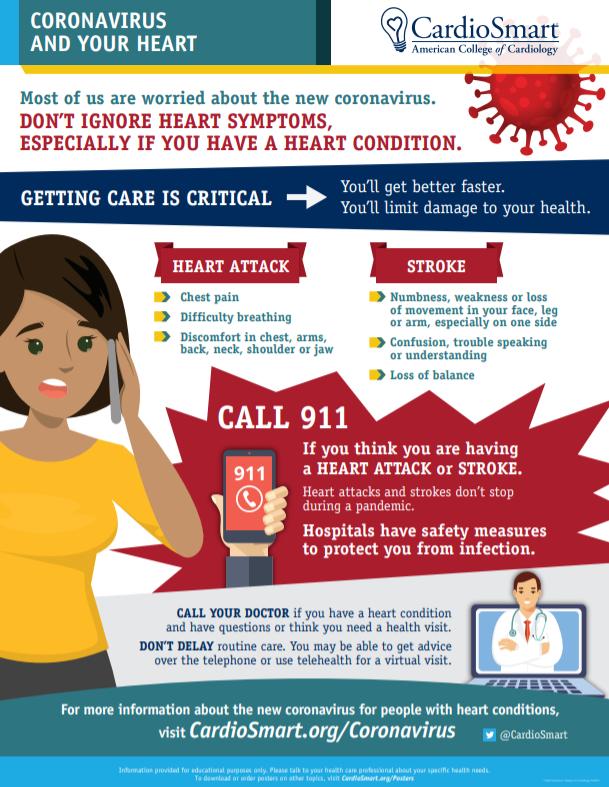After reported drops in heart attack, stroke patients going to ER amid COVID-19 pandemic, new CardioSmart resources outline when, how to seek help

Credit: American College of Cardiology
Through its CardioSmart patient initiative, the American College of Cardiology has issued guidance to encourage patients experiencing a heart attack or stroke to call 911. While hospitals across the United States are experiencing an influx of COVID-19 patients, clinicians are reportedly seeing fewer patients going to emergency rooms for heart attack or stroke. Experts worry that patients who need critical care are delaying their treatment over concerns about the novel coronavirus.
“Due to fears of contracting COVID-19 or taking up space in hospitals, patients experiencing a heart attack or stroke are delaying their essential care, causing a new public health crisis,” said Martha Gulati, MD, FACC, editor-in-chief of CardioSmart.org. “Hospitals and catheterization labs are still treating heart attack and stroke, not just COVID-19, and are taking the utmost precautions to ensure that the novel coronavirus not be spread. The faster a patient is treated, the higher the outcome of survival and lower the risk for complications. No patient should delay their care.”
A new CardioSmart infographic, “Coronavirus and Your Heart: Don’t Ignore Heart Symptoms,” encourages patients to pay close attention to heart attack or stroke symptoms, particularly if they have a pre-existing heart condition, and call 911 immediately if they believe they’re having a heart attack or stroke. The infographic details common heart attack and stroke symptoms and ensures hospitals are taking steps to protect them from COVID-19. The infographic also encourages patients to continue routine heart care to ensure they stay healthy, which may be accomplished through telehealth (remote or virtual visit) or a phone call with their clinician.
“We encourage clinicians to widely distribute these tools to their patients. Make sure that patients know when telehealth is an appropriate option, and when they should call 911 instead,” Gulati said. “Clinicians should work with patients to ensure medication adherence, and always continue to advocate for heart-healthy measures that can be taken even in times of self-isolation and social distancing.”
CardioSmart serves as the ACC’s patient engagement initiative. Reviewed by experts in the CardioSmart COVID-19 Response Work Group, the new infographic joins the full collection of ACC COVID-19 resources, including clinical bulletins, journal articles, patient summaries and more. For more information about how COVID-19 affects patients with pre-existing heart conditions, and to download the full infographic, visit the CardioSmart COVID-19 Hub.
###
The American College of Cardiology envisions a world where innovation and knowledge optimize cardiovascular care and outcomes. As the professional home for the entire cardiovascular care team, the mission of the College and its 54,000 members is to transform cardiovascular care and to improve heart health. The ACC bestows credentials upon cardiovascular professionals who meet stringent qualifications and leads in the formation of health policy, standards and guidelines. The College also provides professional medical education, disseminates cardiovascular research through its world-renowned JACC Journals, operates national registries to measure and improve care, and offers cardiovascular accreditation to hospitals and institutions. For more, visit acc.org.
Media Contact
Sam Roth
[email protected]
Original Source
https:/




